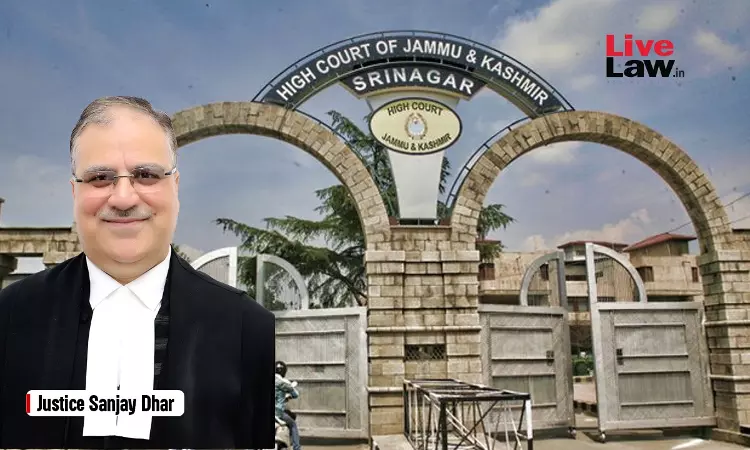S.482 CrPC | Courts Duty Bound To Examine Overall Circumstances To Probe Malicious Intent In Criminal Cases: J&K High Court
LIVELAW NEWS NETWORK
29 March 2025 2:30 PM IST

The Jammu and Kashmir and Ladakh High Court has held that while exercising its inherent power under Section 482 of the Code of Criminal Procedure (Cr.P.C), it is the duty of the Court to look beyond the mere allegations in an FIR or complaint and assess the attending circumstances to determine if the criminal proceedings have been initiated maliciously.
Justice Sanjay Dhar emphasized that if it appears that criminal law is being used as a weapon for personal vendetta, the Court must intervene to prevent the abuse of the judicial process.
Quashing an FIR and criminal proceedings, holding that the case was a blatant misuse of the legal process to harass the petitioners in a civil dispute. Justice Dhar, underscored that the High Court owes a duty to look into the attending and overall circumstances, beyond the FIR's averments, to assess whether criminal proceedings were initiated maliciously.
The ruling came in response to a petition challenging a FIR registered at Police Station Domana, Jammu, under Sections 425, 436-A, 506, and 120-B of the Ranbir Penal Code (RPC). The petitioners, Smt. Suresh Parihar and others, approached the Court seeking quashing of the FIR, claiming that the complaint was a misuse of criminal law to settle a civil dispute.
The case arose from a complaint by respondent No. 2, Kulwant Manhas, who alleged that the petitioners, his neighbors sprayed chemicals on the plants and trees growing in his compound, causing them to wither. He further alleged that despite an earlier complaint already pending in court, the petitioners once again trespassed onto his land and repeated the act. On the basis of these allegations, the Chief Judicial Magistrate, Jammu, directed the police to register an FIR under Section 156(3) Cr.P.C.
Justice Dhar scrutinized the facts of the case and found that the allegations were primarily rooted in a property dispute and long-standing enmity between the parties.
“All these facts when seen in context, that there is a dispute of a civil nature going on between the petitioners and the complainant party who has repeatedly made similar types allegations against the petitioners by filing successive criminal complaints against them, go on to show that this is a classic case of respondent No. 2-complainant trying to wreck vengeance upon the petitioners with a view to spite them and to coerce them to settle a civil dispute at his terms”,the court recorded.
The Court underscored that criminal law cannot be allowed to be misused as a tool to settle private grievances. Relying on the Supreme Court's rulings in State of Haryana v. Bhajan Lal (1992) and Indian Oil Corporation v. NEPC India Ltd. (2006), the Court reiterated that inherent jurisdiction under Section 482 Cr.P.C must be exercised to prevent malicious prosecution. The Court stated,
"The High Court, while exercising its inherent power under Section 482 of Cr.P.C, owes a duty to look into attending and overall circumstances besides the averments made in the FIR or complaint to assess whether the criminal proceedings were initiated maliciously”.
Referring M/S. Medchl Chemicals Pharma P. Ltd vs M/S. Biological E. Ltd. & Ors, 2000(3) SCC 269, the court observed that frustrated litigants ought not to be encouraged to give vent to their vindictiveness through legal process and such an investigation ought not to be allowed to be continued since the same is opposed to the concept of justice, which is paramount.
Justice Dhar emphasized that mere allegations in an FIR cannot be taken at face value when surrounding circumstances indicate that the complaint may be motivated by personal animosity. The Court found that the allegations against the petitioners lacked substantive evidence to justify criminal prosecution.
It observed that the complainant had framed the dispute as a criminal offense, despite its actual nature being civil. The court stressed that such matters should be resolved in appropriate civil forums rather than through criminal litigation.
In light of these observations, the High Court quashed the FIR, holding that its continuation would amount to an abuse of judicial process.
Case Title: Smt Suresh Parihar Vs State of J&K
Citation: 2025 LiveLaw (JKL) 125


